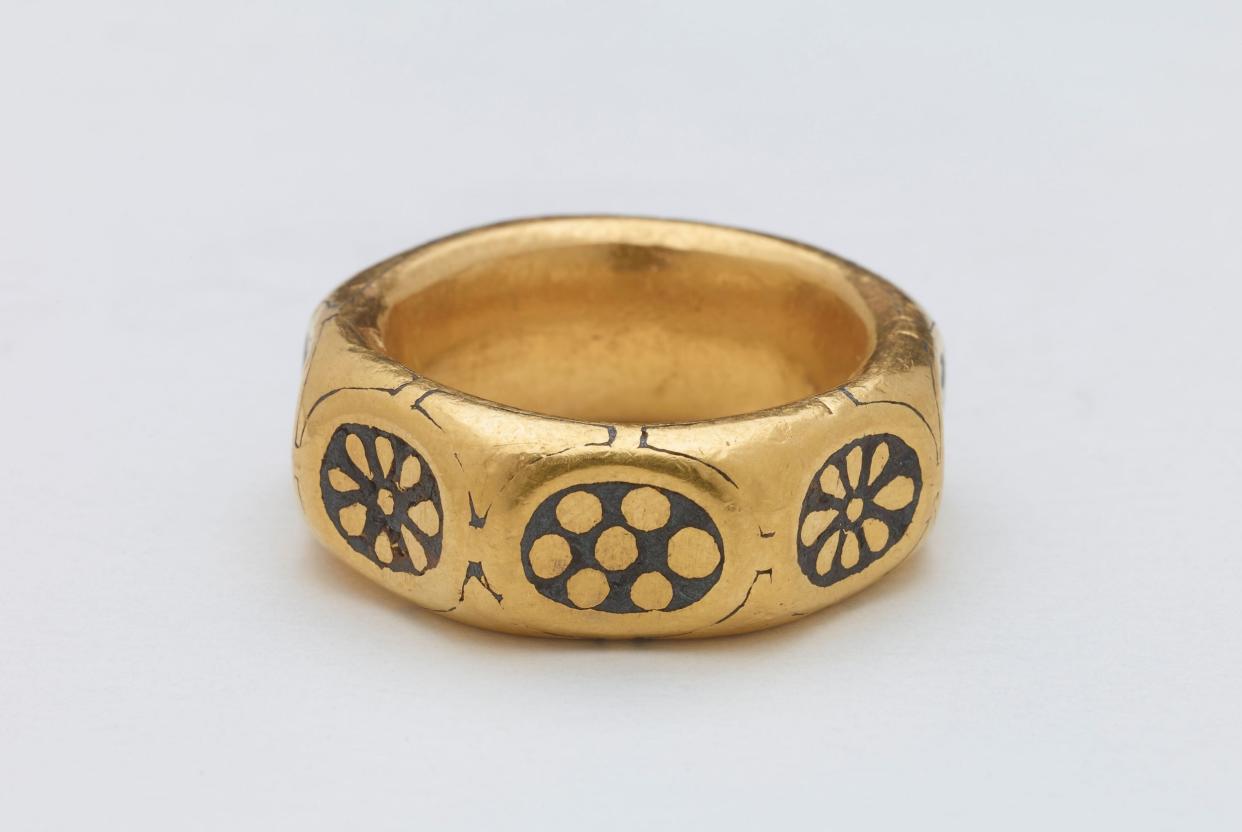Metal detectorists convicted of trying to sell £3m Viking treasure hoard on black market

A pair of metal detectorists have been convicted of stealing a hoard of Viking coins and jewellery potentially worth £3m – much of which is still missing.
George Powell and Layton Davies covered up their once-in-a-lifetime discovery of a collection dating to King Alfred the Great’s reign 1,100 years ago, and planned to sell it off in small batches.
Prosecutors said the items, many of which were Anglo Saxon but were typical of a Viking burial hoard, were dug up at Eye Court Farm near Leominster, Herefordshire, on 2 June, 2015.
Contained in the hoard was a ninth century gold ring, a dragon’s head bracelet, a silver ingot, a crystal rock pendant dating to the fifth century and up to 300 coins. Only 31 coins have been tracked down.
Powell, 38, and Davies, 51, were convicted of conspiring to conceal the find alongside two other men, 60-year-old Paul Wells and Simon Wicks, 57, both coin-sellers.
By law, the experienced detectorists should have reported their rare discovery but instead decided to sell the items in small batches on the black market.
All treasure found in the UK belongs to the Crown, and a Treasure Valuation Committee decides how it should be shared among the finder and the landowner or tenant.
Davies, who elected to give evidence in his defence, claimed he and Powell retrieved the jewellery from two separate holes – but photographs taken on his phone which he later deleted, but police recovered, clearly showed the trove as one.
One of the images appeared to show considerably more silver ingots than the single block found by police, but the men claimed they were just bullet casings.
In court both Powell and Davies claimed that talk of a 300-coin hoard had been merely a rumour, insisting that the only coins they had found were declared to the National Museum Wales, in Cardiff, at a meeting on 8 July.
However, they were undone by evidence including deleted photos of a much larger hoard on Davies’s phone and the recovery of various coins, including five concealed in a magnifying glass case and handed in to police by Wells.

Wicks, Powell and Davies were also found guilty of converting their ill-gotten gains into cash, after police traced several coins that had been sold on to private collectors, hidden away or left with expert valuers.
All four defendants denied the charges but were convicted after a jury of six men and six women deliberated for eight and a half hours following a seven-week trial.
Expert analysis of all the jewellery and coins recovered to date – now held by the British Museum – suggested they were worth at least £581,000. The items, which are Saxon but were apparently hidden by a Viking, “enable us to re-interpret our history at a key moment in the creation of England as a single kingdom,” the museum’s early coin curator, Gareth Williams, told the BBC.
Five of the coins are examples of the exceptionally rare Two Emperors penny, valued at up to £50,000 apiece, and so-called as they depict King Alfred and a lesser known monarch, Ceolwulf II, who reigned in the old kingdom of Mercia, sitting together.
Prosecuting barrister Kevin Hegarty QC told jurors the remainder of the hoard had not been located. “They must be concealed in one or more places or, by now, having been concealed, have been dispersed, never to be reassembled as a hoard of such coinage again.”
Powell, of Kirby Lane, Newport; Davies, of Cardiff Road, Pontypridd; Wells, of Newport Road, Cardiff; and Wicks, of Hawks Road, Hailsham, East Sussex, are due to be sentenced on Friday.
Adjourning the case for a hearing on Friday, Judge Nicholas Cartwright said: “I am not going to admit George Powell bail, he’s going to be sentenced for theft of items worth millions of pounds and is facing a very long sentence of imprisonment and in addition to that there will inevitably be a confiscation process.
“There are hidden assets by way of unrecovered treasure worth a very large sum, probably millions of pounds, so there’s the prospect of a very long default period of imprisonment should the assets remain hidden.”
Davies and Wicks were also remanded in custody.
Speaking afterwards, Detective Constable Nigel Cleeton, who led the West Mercia Police investigation, welcomed the verdicts and appealed to the public for information to “help us find the rest of this hoard and put it back together”.
Additional reporting by agencies
Read more
Inside ‘UK version of Tutankhamun’s tomb’ found near pub and an Aldi

 Yahoo News
Yahoo News 